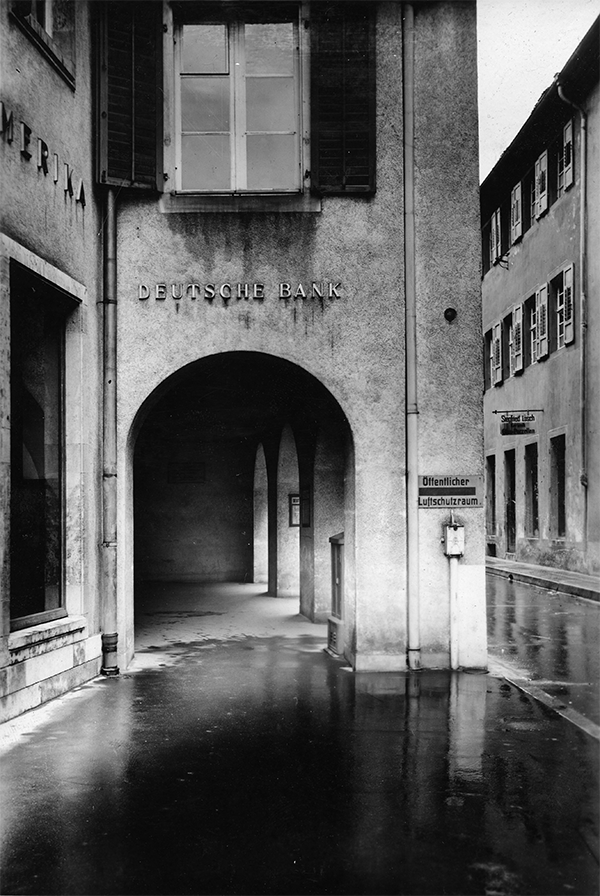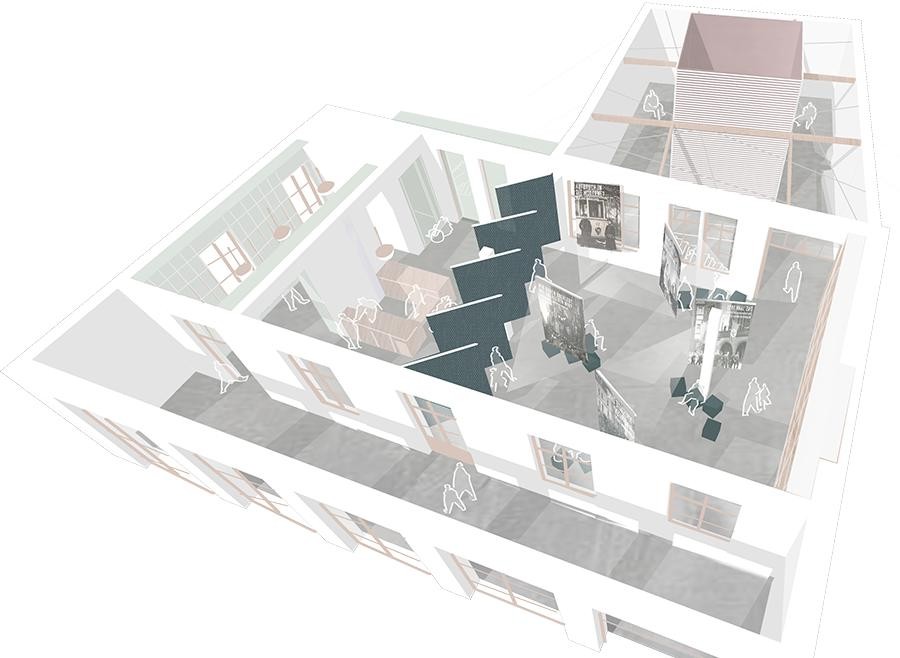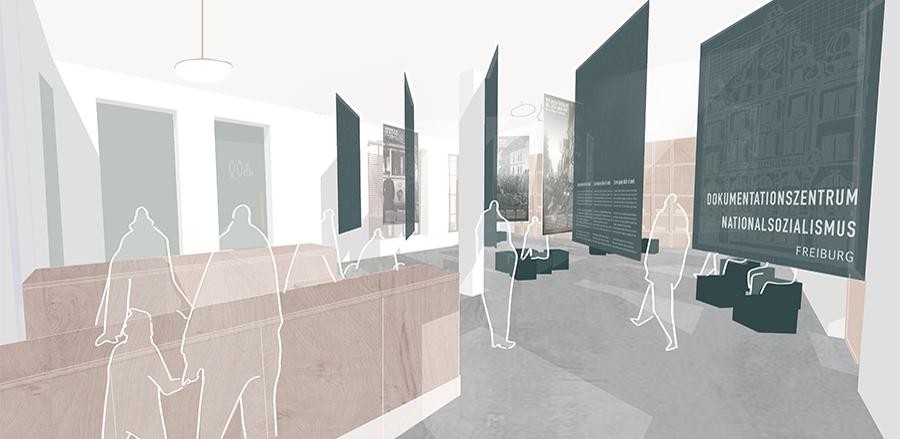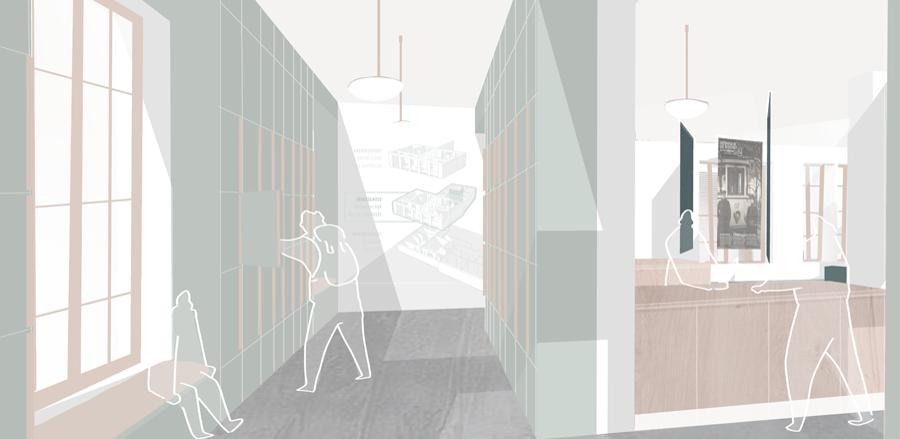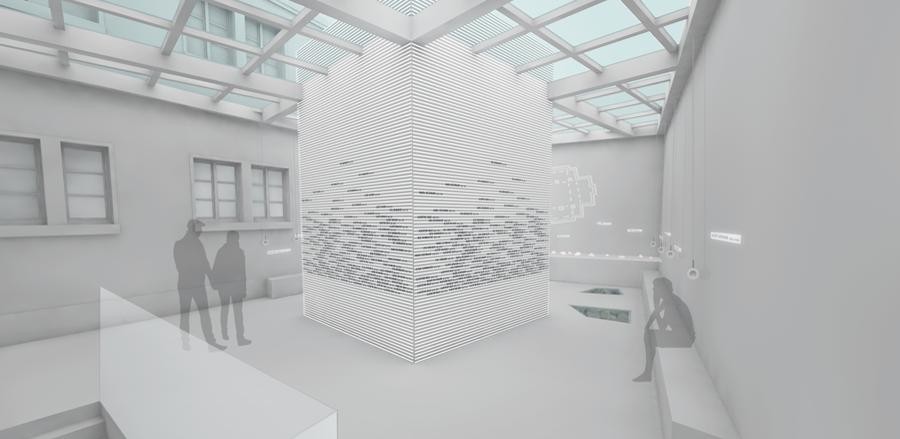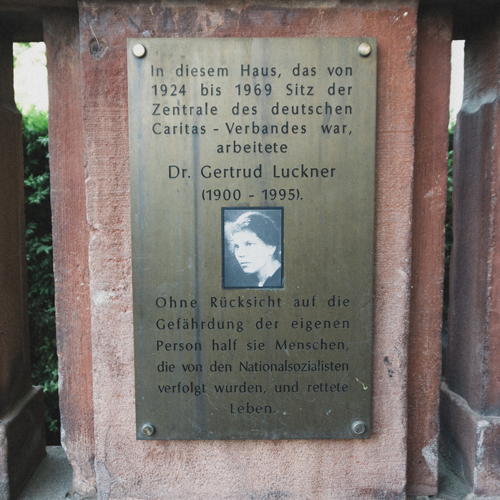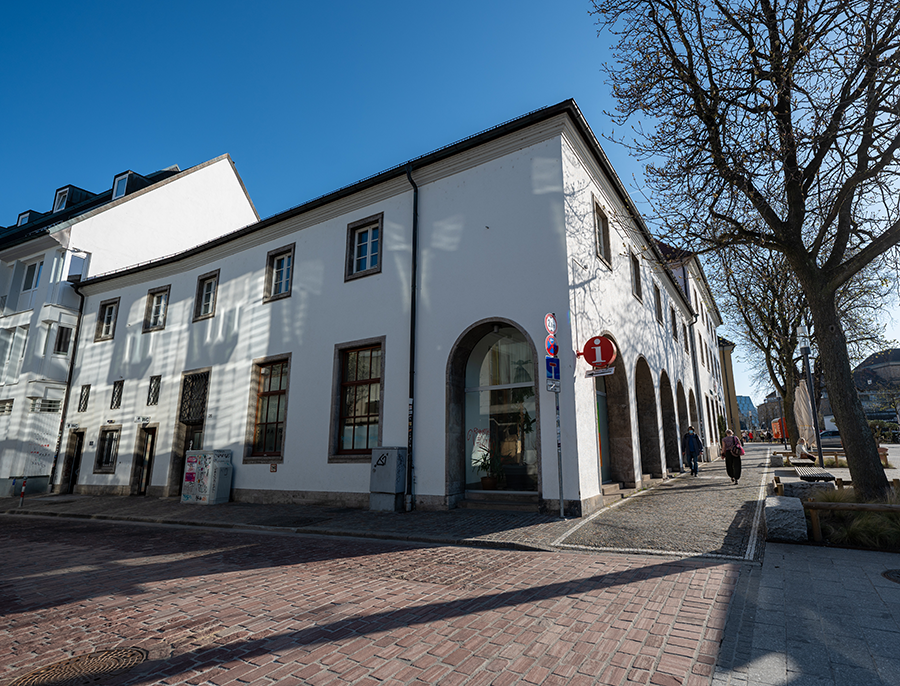I think it’s incredibly important for Freiburg to have a place of remembrance. We must never forget the occurrences and crimes that took place during the National Socialist era. Knowing about the past helps us to understand the present more clearly – and to make the correct decisions about the future in a responsible way. Our documentation centre plays an important role in this.
Martin Horn, chief mayor of the city of Freiburg
Freiburg needs a documentation centre on National Socialism to remind us citizens of the city where hate and exclusion can lead. We must decisively oppose such tendencies in our midst. Remembrance and education are the most important components for doing this.
Ulrich von Kirchbach,senior mayor of the city of Freiburg
Remembrance is learning for the future. The threats to democracy make it clear how vulnerable open societies and individual people are to authoritarian temptations. Remembrance should serve as a warning to stay alert, not to keep quiet and look away, but be actively committed to democracy. A vibrant remembrance culture is vital for the political education of today.
Prof. Dr. Michael Wehner,Federal Centre for Political Education Freiburg
Now that the last eyewitnesses are passing away, every major German city needs a documentation centre of National Socialism. It’s important to remember that National Socialism was not a phenomenon that arrived like a force of nature, but that it had its figureheads and followers all over Germany. This also applies in Freiburg, even though today it seems so tranquil and romantic in its centre.
Prof. Dr. Felix Hinz,
Pädagogische Hochschule Freiburg
Freiburg must be truthful: not hide the fact that Nazis committed crimes here, too. Above all, young people must learn to condemn human rights abuses and defend democratic values. Honour victims: They should be remembered; perpetrators and hangers-on should be named; resistance campaigners and rescuers should become role models; learning in an authentic place enriches the educational process.
Wolfgang Dästner,Against Oblivion - For Democracy charity
Freiburg needs a documentation centre so that all the people who were persecuted and murdered owing to racism, sexism, eugenics and political convictions are not forgotten. The documentation centre must remind us to be on the lookout for movements that marginalise people and to work towards a tolerant, democratic and open society that is characterised by diversity and that all people are able to participate in.
Friedhilde Rißmann-Schleip
work group National Socialist euthanasia and exclusion today of the Freiburger Hilfsgemeinschaft e.V.
As co-founder of the campaign Freiburg needs a place of vigilance and memorial, established in 2009 together with Marlis Meckel and Peter Künzel, I believe that the lack of a memorial to the history of National Socialism, which is only now being planned, is a painful shortcoming for Freiburg. In this way, access to the terrorism of the National Socialist dictatorship anchored in the city’s memory is still denied to this day.
Andreas Meckel, Initiative Freiburg needs a place of vigilance and memorial
"It happened and therefore it can happen again."
If Freiburg really intends to take the harshly succinct assessment of ex-Auschwitz prisoner Primo Levi seriously, then the Freiburg Documentation Centre of National Socialism must:
- remember all its victims,
- research the crimes perpetrated, their presuppositions as well as their consequences for the city of Freiburg and surrounding regions,
- communicate the results of this post-research
Franz Brockmeyer, Gertrud Luckner Library, Freiburg
Homosexual men were persecuted according to § 175 during the National Socialist era. More than 5,000 from them were sent to concentration camps; more than half of them were murdered there.
This homosexual paragraph remained unchanged in the Federal Republic of Germany until the year 1969.
All those who do not love in a heterosexual way or conform to the gender roles find this memory painful. Never again should love or gender be a reason for persecution.
Anke Rietdorf, Mathias Falk, Rosa Hilfe e.V. Freiburg
History will be brought to life at municipal level. Here it will be possible to see and learn how a dictatorship develops, how it enforces itself, whom it ostracises and destroys, why it is successful and the catastrophic damage that it leaves behind. Those who are not interested in this also have no interest in current developments that threaten our democracy.
Prof. Dr. Thomas Schnabel, historian, Stuttgart
From the very beginning of my project COBBLESTONE MEMORIALS in FREIBURG I wanted the biographies of those persecuted during the Nazi terror to be made available in a documentation centre. Then the suffering of these innocent people can serve to ensure that the respective necessary lessons can be learned for the present and the future!
Marlis Meckel, Cobblestone Memorials in Freiburg
During times in which an increase of hostility to foreigners, anti-Semitism and intolerance can be detected, it is only possible to prevent historical amnesia by establishing a place of remembrance that makes history perceivable. Only a well-founded representation of history, underpinned with historical objects (visual history) can expand awareness and preventatively combat persecution myths.
Irina Katz, Israelite community of Freiburg
News
With a planned opening in 2023 in the former tourist office on Rotteckring (built in 1936), we announce the construction of:
- a place to find out information about the National Socialist era in Freiburg (with a permanent exhibition as well as special temporary exhibitions)
- a point of contact for documentation and research about the National Socialist era in Freiburg (e.g. acquisition of the estate of Gertrud Luckner as well as parts of the Gertrud Luckner Library, partnerships with universities, archives as well as institutions and action groups in south Baden and beyond)
- a central place of remembrance to the victims of the National Socialist dictatorship (publicly accessible room of remembrance in the roofed courtyard of the building and opportunity for quiet recollection)
- an educational and discussion room, with a focus on the topics of democracy and diversity (workshops, podium discussions, readings, e.g. in the "HistoryLab" for teenagers and young adults, digital programmes for in-depth studies)
Even if the documentation centre will first open its doors to visitors in 2023, the work on its content is already taking shape.
The following is planned for the years 2021–2023:
- Design and realisation of eyewitness interviews in partnership with SWR Freiburg public broadcasting corporation
- Workshops, discussions and lecture events, e.g. in partnership with the Federal Centre for Political Education
- Ideas-workshops with Freiburg schools and students of the University of Freiburg on the topic "remembrance culture 4.0"
- Partnership with civic institutions from Freiburg and south Baden
If you are interested in a partnership or would like to get in touch with us, we would be delighted to hear from you: julia.wolrab@stadt.freiburg.de
What is actually planned?
On a plot of ca. 800 square metres, we will establish an institution that deals explicitly with the history of Freiburg during the National Socialist era. The permanent exhibition, over three storeys, will examine the time from the Weimar Republic to the present day in the year 2023. The narrative to this exhibition will take a multi-perspective approach to this history.
This goes beyond simple black & white dichotomies: the exhibition will not simply tell the story of the “perpetrators” on the one side, and the “victims” on the other. The grey areas are interesting: why did a person who supported the SS get involved with saving the lives of Jews? Why did the friend of a Jewish family later enrich themselves from that family’s property? How could it be that someone who had supported and practised National Socialist ideology could be successfully employed in the city administration after 1945?
It’s important to pose and discuss new questions continually, to explore new research findings and to ask: what have they got to do with our present?
The documentation centre will be a place that enables dialogue, cooperation and discussion to take place – without pointing an incriminating finger, but with a clear stance: a commitment to our democratic society in which discrimination, exclusion and degradation have no place.
As well as the documentation centre, the Federal Centre for Political Education will also move into the building at Rotteckring 14 in the 2023. The physical closeness and numerous thematic overlaps will offer both institutes a good basis for exchange, partnership and joint events at the heart of Freiburg.
What will be the main points of focus?
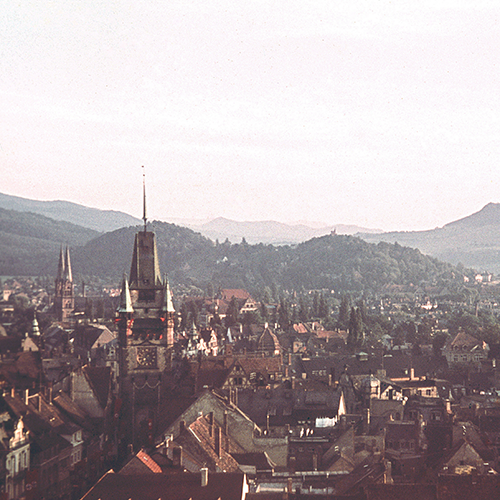
How National Socialism and its inhuman ideology was established
The permanent exhibition explores the structures and ideology of National Socialism, but also of the Freiburg society that, to a substantial extent, sustained it. Why did more and more people become enthusiastic about National Socialism or, at the very least, did not question it?
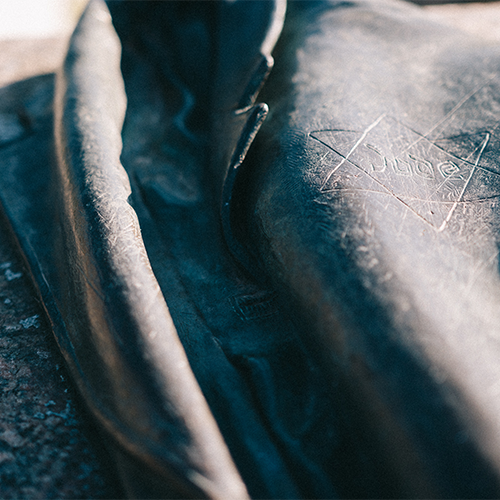
Discrimination, persecution, expulsion and mass murder
A central exhibition cluster as well as the centre’s room of remembrance will focus on the people whom the system excluded, discriminated against, persecuted, expelled and murdered. They were Freiburg residents who were pursuing their professions, distinguished citizens of the city, whose families were deeply rooted here.They had shaped and enriched Freiburg through their cultural, societal and religious identities. Even today, they leave a gap that can never be closed.
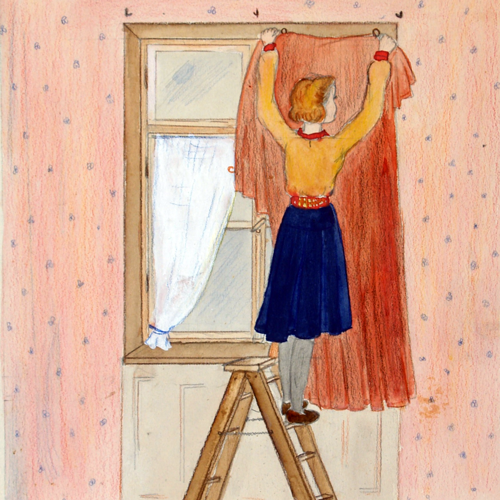
Everyday life during WW2 in Freiburg
The violence of National Socialism had not only an internal but also an external influence. The war of aggression was thought through and prepared, right from the beginning. The exhibition will spotlight “Everyday life in Freiburg during the war” and the traumatic effect on many people of the bombing of the city on 27th November 1944 in particular.
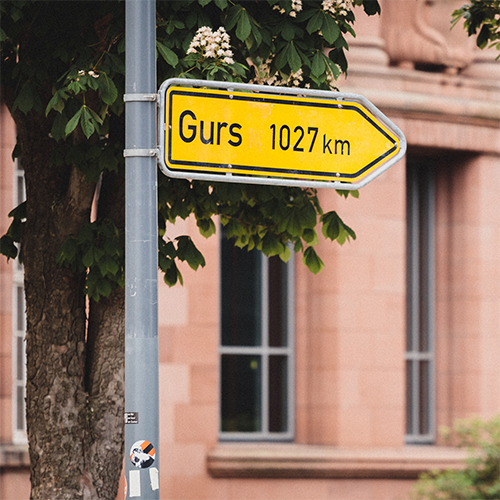
Freiburg after 1945
The end of the war, reconstruction of the city and the development of democratic structures by the Allies are contrasted with the long suppression and denial of Germany’s own past. Even Freiburg had its difficulties with establishing a culture of remembrance for the National Socialist era. This had to be demanded time and again by surviving relatives of those murdered as well as dedicated civic organisations. The history of the suppressed reappraisal, which stretches to the present day, will be part of the final exhibition cluster.
The history of the foundation of the documentation centre
Action groups such as "Freiburg needs a place of vigilance and memorial" have been urging for a documentation and information centre to be established in Freiburg for many years. This idea was continually put on the table in the past, thanks to the civic commitment of many Freiburg residents. The path towards the realisation of this idea was not easy. The city continually postponed its realisation of a centre, for cost reasons among other things. Two events gave important impetus to the implementation:
In the year 2016, a special exhibition on the topic of “National Socialism in Freiburg” was held in the Augustinermuseum. The work on this project made it clear that there were still many gaps in the topic of National Socialism in Freiburg and, at the same time, that there was considerable public interest. The exhibition, which was on display from 26th November 2016 to 7th October 2017, welcomed over 80,000 visitors. The idea for an information and documentation centre was crystallised as a result.
Almost parallel to the exhibition, foundation stones of the old synagogue were discovered during renovation work on the Platz der Alten Synagoge in 2016. In order to be able to commemorate the history of Freiburg’s synagogue in a dignified manner, these should be permanently integrated in a room of remembrance, annexed to the documentation centre. The finding of the synagogue stones made the construction of a documentation centre even more necessary.
On 24th June 2018, the municipal council unanimously passed a resolution to establish a documentation centre of National Socialism in Freiburg, which is now being implemented.
The renovation
The renovation of the former tourist office on Rotteckring will begin in mid-2022.
The preparations between the city administration, the mArtin Architekten architectural office and the design team from gewerkdesign are already in full swing, because: there is still a lot to do! For example, the inner courtyard of the building needs to be roofed over – it will become the place of remembrance.
Who is involved?
The Documentation Centre of National Socialism will organisationally be part of Freiburg City Museums.
Without the voluntary work and involvement of dedicated people on the committee, in the remembrance work group and the historians’ work group, the establishment process would however not be possible.
Special thanks therefore to (in alphabetical order):
- François Blum, Nachkommen, Verwandte und Freunde der Mitglieder der ehemaligen israelitischen Gemeinde Freiburg e. V.
- Franz Brockmeyer, Gertrud-Luckner-Bibliothek Freiburg
- Wolfgang Dästner, Gegen Vergessen – Für Demokratie e. V.
- Rosita Dienst-Demuth, Geschichtswerkstatt der Lessing-Realschule Freiburg
- Hans-Georg Dietrich, Schuldekan Evangelische Landeskirche Baden
- Christina Eckert, Universität Freiburg
- Mathias Falk, Rosa Hilfe e. V. Freiburg
- Jost Grosspietsch, Landesarbeitsgemeinschaft der Gedenkstätten und Gedenkstätteninitiativen Baden-Württemberg (LAGG)
- Cornelia Haberlandt-Krüger, Egalitäre Jüdische Chawurah Gescher e. V.
- Dr. Katrin Hammerstein, Fachbereich Gedenkstättenarbeit, Landeszentrale für politische Bildung Baden-Württemberg
- Max Heinke, VVN-BdA Freiburg
- Detlev Heyder, Anwalt, Kanzlei Heyer – Klie – Schindler, Freiburg
- Prof. Dr. Felix Hinz, Pädagogische Hochschule Freiburg
- Dr. Andrea Hoffend, Lernort Zivilcourage und Widerstand e. V. Kislau
- Barbara Kaiser-Burkart, AK „NS-Euthanasie und Ausgrenzung heute“ der Freiburger Hilfsgemeinschaft e.V..
- Irina Katz, Israelitische Gemeinde Freiburg KdöR
- Jessica Mack, Geschichtswerkstatt der Lessing-Realschule Freiburg
- Prof. Dr. Bernd Martin, Historisches Seminar der Universität Freiburg
- Marlis und Andreas Meckel, Stolpersteininitiative Freiburg und Initiative „Freiburg braucht eine Mahn- und Gedenkstätte“
- Monika Rappenecker, Projekt „Nazi-Terror gegen Jugendliche“
- Friedhilde Rißmann-Schleip, AK „NS-Euthanasie und Ausgrenzung heute“ der Freiburger Hilfsgemeinschaft e.V.
- Sylvia Schliebe, Egalitäre Jüdische Chawurah Gescher e. V.
- Dr. Christoph Schmider, Diözesanstelle Archive, Bibliotheken, Schriftgutverwaltung der Erzdiözese Freiburg
- Prof. Dr. Gisela Riescher, Seminar für Wissenschaftliche Politik der Universität Freiburg
- Prof. Dr. Thomas Schnabel, ehem. Direktor des Hauses der Baden-Württembergischen Geschichte Stuttgart
- Dr. Heinrich Schwendemann, Historisches Seminar der Universität Freiburg
- Ingrid Wagner, AK „NS-Euthanasie und Ausgrenzung heute“ der Freiburger Hilfsgemeinschaft e.V.
- Bernd Wagner, DGB Stadtverband Freiburg
- Tomas Wald, Roma-Büro Freiburg
- Prof. Dr. Michael Wehner, Landeszentrale für politische Bildung Freiburg
- Erika Weisser, VVN-BdA Freiburg



